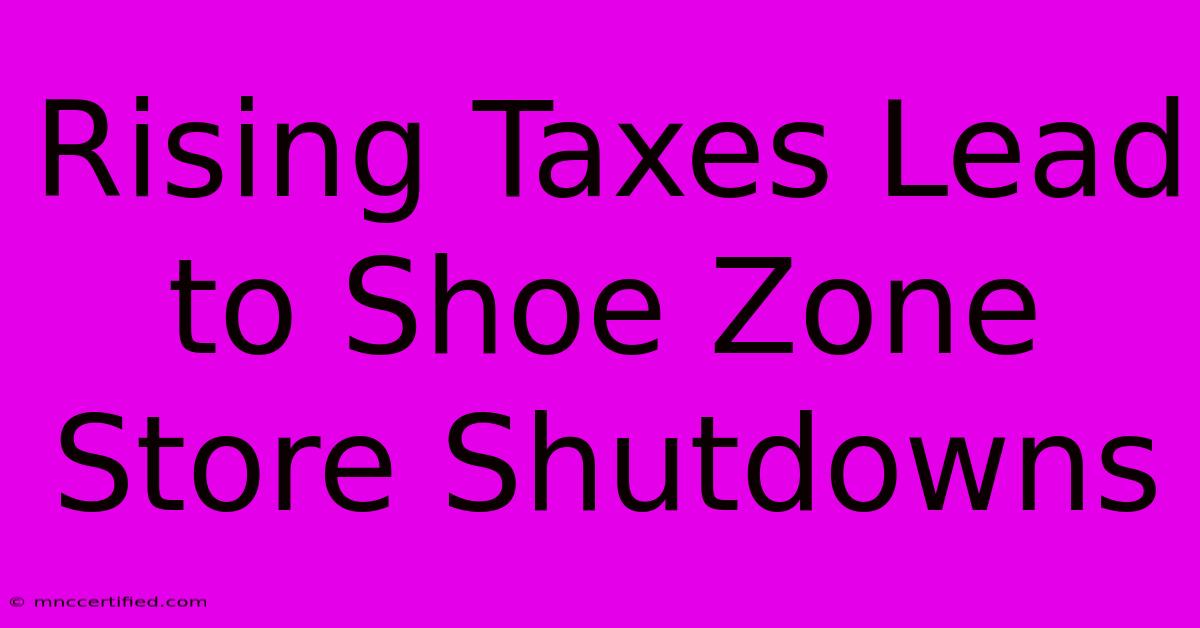Rising Taxes Lead To Shoe Zone Store Shutdowns

Table of Contents
Rising Taxes Lead to Shoe Zone Store Shutdowns: A Deep Dive into the Retail Crisis
The UK high street is facing another blow, with popular footwear retailer Shoe Zone announcing the closure of multiple stores. While the company cites a variety of challenges, rising business taxes are emerging as a significant contributing factor to this difficult decision. This article will delve into the reasons behind these closures, exploring the impact of taxation on the retail sector and the wider implications for the UK economy.
The Perfect Storm: Factors Contributing to Shoe Zone's Closures
Shoe Zone's recent announcement isn't an isolated incident; it reflects a broader struggle faced by many brick-and-mortar retailers. Several factors contribute to this perfect storm, including:
-
Increased Business Rates: Business rates, a property tax based on the rateable value of a commercial property, have consistently risen in recent years. For retailers with numerous physical stores, this represents a substantial and often unpredictable cost burden. This is arguably the most significant factor driving Shoe Zone's decision. High business rates make it increasingly difficult to operate profitably, particularly in less affluent areas where footfall may be lower.
-
Inflation and Increased Costs: Soaring inflation has significantly impacted the cost of goods, energy, and staffing. These increased operational expenses further squeeze profit margins, making it harder for retailers to absorb the impact of rising taxes.
-
Shifting Consumer Behavior: The rise of online shopping continues to pose a significant challenge to traditional brick-and-mortar stores. Consumers are increasingly drawn to the convenience and often lower prices offered by online retailers.
-
Supply Chain Disruptions: The lingering effects of the pandemic and geopolitical instability continue to cause supply chain disruptions, leading to increased costs and difficulties in sourcing inventory.
The Impact of Rising Business Rates on Small and Medium-Sized Enterprises (SMEs)
The impact of rising business rates is particularly acute for SMEs like Shoe Zone. These businesses often have limited financial reserves and less negotiating power compared to larger corporations. The added burden of increased taxation can be the tipping point, forcing them to make difficult decisions like store closures or even bankruptcy. This contributes to job losses and a decline in high street vitality.
The Wider Implications: A Dying High Street?
The closure of Shoe Zone stores is a stark reminder of the challenges facing the UK high street. The cumulative effect of rising taxes, inflation, and changing consumer behavior paints a concerning picture for many retailers. This raises concerns about:
-
Job Losses: Store closures inevitably lead to job losses, impacting both employees and the wider community.
-
Empty Shopfronts: Vacant retail spaces contribute to the decline of high streets, creating a negative feedback loop that further discourages businesses and consumers.
-
Reduced Tax Revenue: Ironically, the increased taxation aimed at generating revenue may ultimately lead to reduced tax revenue due to business closures and economic downturn.
What Can Be Done? Government Intervention and Long-Term Solutions
Addressing the crisis requires a multifaceted approach:
-
Business Rates Reform: The government needs to seriously consider reform of the business rates system, potentially introducing fairer assessments or providing targeted relief for SMEs.
-
Support for High Streets: Initiatives promoting high street regeneration, attracting independent businesses, and encouraging footfall are vital.
-
Investment in Infrastructure: Improving transport links and digital connectivity can help revitalize high streets and make them more attractive to both businesses and consumers.
The closure of Shoe Zone stores is a symptom of a deeper problem affecting the UK retail sector. Tackling the issue requires a concerted effort from the government, businesses, and consumers to ensure a thriving and sustainable high street for the future. Failing to address the impact of rising taxes could lead to further closures and a more significant decline in the UK's economic landscape. The future of the high street hinges on effective and immediate action.

Thank you for visiting our website wich cover about Rising Taxes Lead To Shoe Zone Store Shutdowns. We hope the information provided has been useful to you. Feel free to contact us if you have any questions or need further assistance. See you next time and dont miss to bookmark.
Featured Posts
-
Arsenal Vs Crystal Palace Live Score Updates
Dec 19, 2024
-
Intercontinental Cup Madrid Pachuca Lineups
Dec 19, 2024
-
Us Reports First Severe Human Bird Flu
Dec 19, 2024
-
Federal Reserve Rate Cut Fewer Ahead
Dec 19, 2024
-
Iconic Lorry Brands Founder Dies
Dec 19, 2024